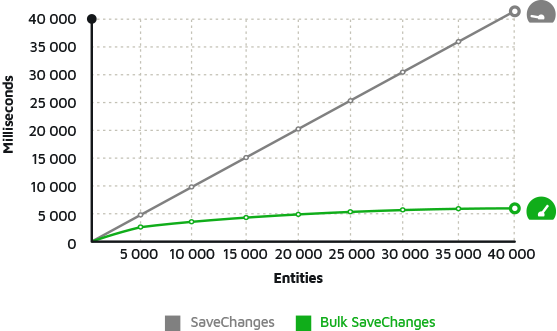Entity Framework Batch Update Discover who supports this feature
Introduction
Batch Update allows you to improve EF performance by updating multiple records in a database from a LINQ Query without loading entities.
Why Batch Update?
For HUGE performance gains, everything is executed on the database side. To use batch update, you will need to use a third-party library.
Google Related Searches
StackOverflow Related Questions
- How to Bulk Update records in Entity Framework?
- Entity Framework update/insert multiple entities
- Batch update on object list using EntityFramework 6 and Linq
// using Z.EntityFramework.Plus; // Don't forget to include this. // UPDATE all users inactive for 2 years ctx.Users.Where(x => x.LastLoginDate < DateTime.Now.AddYears(-2)) .Update(x => new User() { IsSoftDeleted = 1 });
Supported Libraries
| Library | Type | EF Version | Support | Doc | Features |
|---|---|---|---|---|---|
| Z.EntityFramework.Classic | FREE/PRO | EF6 | < 1 Day | Yes | Bulk SaveChanges Bulk Insert Bulk Update Bulk Delete Bulk Merge Batch Delete Batch Update Cache Deferred Query Future |
| Z.EntityFramework.Plus | FREE | EF5 EF6 EF Core |
< 1 Day | Yes | Audit Batch Delete Batch Update Cache Deferred Query Filter Future Include Filter Include Optimized |
Unsupported Libraries
Use these libraries at your risk!
| Library | Type | EF Version | Support | Doc | Features |
|---|---|---|---|---|---|
| EFUtilities | FREE | EF5 EF6 |
No | No | Bulk Insert Batch Delete Batch Update Include Optimized |
| EntityFramework.Extended | FREE | EF5 EF6 |
No | Yes | Audit Batch Delete Batch Update Cache Future |
ZZZ Projects
